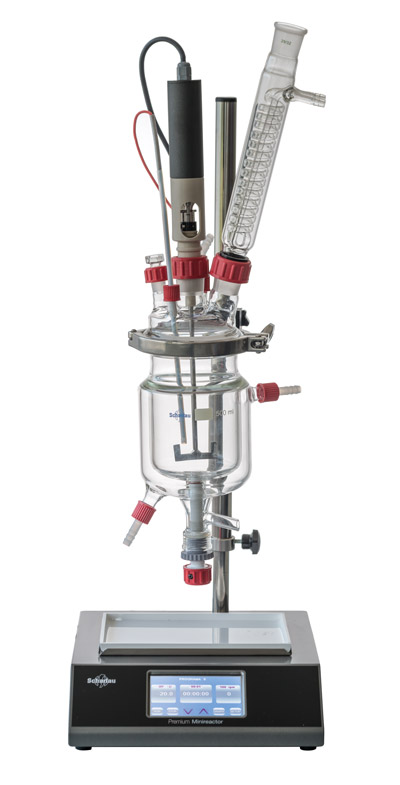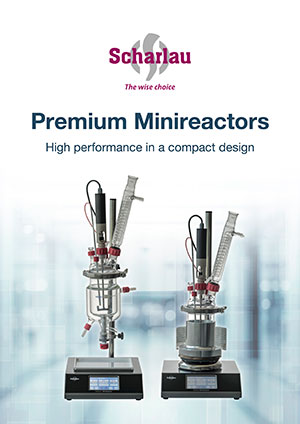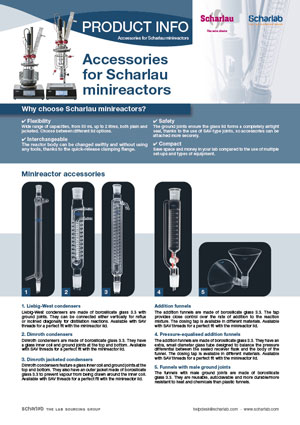Scharlau Minireactors: everything you need to know
10 de October de 2024Scharlau minireactors are reactors for the laboratory that require precise and adaptable small-scale chemical reactions. Designed to enhance efficiency, these devices are ideal for a wide range of applications, from chemical synthesis to catalytic assays. Below, we outline some key points regarding the use, maintenance, and customisation of Scharlau Minireactors.
What replacement parts are available for the minireactors?
To maintain the optimal performance of Scharlau minireactors, a variety of essential replacement parts is available:
- O-ring between the vessel and the lid:
- 500-0MRJ25 (O-ring 2½”)
- 500-00MRJ3 (O-ring 3”)
- 500-00MRJ4 (O-ring 4”)
- Stirring seal O-ring:
- OR6X178SIL
These components are specifically designed to support regular maintenance of the equipment, ensuring ongoing and trouble-free operation.
Do I need a technician to install the minireactor?
Scharlau minireactors arrive fully assembled and are ready for use straight out of the box. Should you need further assistance, we provide a comprehensive video manual on our website, which offers clear guidance on how to adjust and operate the equipment, ensuring that even users with less experience can handle it with confidence.
Is it possible to get a customised lid for the minireactor?
Yes, at Scharlau, we offer standard lids available in our catalogue, but we can also provide customised lids tailored to the specific needs of your laboratory. These customisations can include different numbers and sizes of openings, allowing for greater versatility in experimental applications. For more details, please contact our customer service team.
Can the minireactor be used with different capacities of reaction vessels?
Absolutely. The minireactor can accommodate various reaction flasks that use the same flange clamping system, provided the dimensions are compatible with the reactor’s opening. For example, with a 4” flange, you can use flasks of 500, 1000, or 2000 ml. Depending on the selected vessel, you may need a different stirring rod. Additionally, for minireactors equipped with a heating system, the corresponding heating block for the specific size of the reaction flask is required.
What applications can the minireactors be used for?
Scharlau minireactors are highly versatile, primarily designed for liquid-phase synthesis. However, with minor modifications to the standard models, they can be adapted for a range of applications, such as peptide synthesis, catalytic tests, or even fermentation. This flexibility makes them an indispensable tool for laboratories looking to expand their experimental capabilities.
Can I operate the Minireactor at low speeds, specifically below 100 rpm?
Yes, the Minireactors can be operated at low speeds. They can be equipped with a mechanical stirrer that allows for operation within a range of 1 to 100 rpm or 40 to 400 rpm, depending on the specific requirements of your experiment. This feature ensures precise control over stirring, ideal for delicate processes that require low speeds.
What are the key technical features of the Minireactors?
Scharlau Minireactors are designed to provide an optimal user experience and incorporate advanced technical features such as:
- A mechanical stirrer with quick and easy alignment.
- Easy adjustment of the stirrer blade height.
- A telescopic stand.
- Quick locking and unlocking without the need for additional tools.
- Silicone/FEP O-ring and PTFE self-centring ring.
- Use of chemically resistant materials, including a stirrer blade made of Hastelloy®.
- Vessel capacities ranging from 50 ml to 2000 ml.
- An aluminium heating block for uniform and rapid heating (HME-R model).
- A compact design with optimised dimensions.
Scharlau minireactors offers a complete and adaptable solution to meet the evolving needs of modern laboratories.
For more information or to enquire about a specific model, please contact us at helpdesk@scharlab.com.

 Rest of the World
Rest of the World




